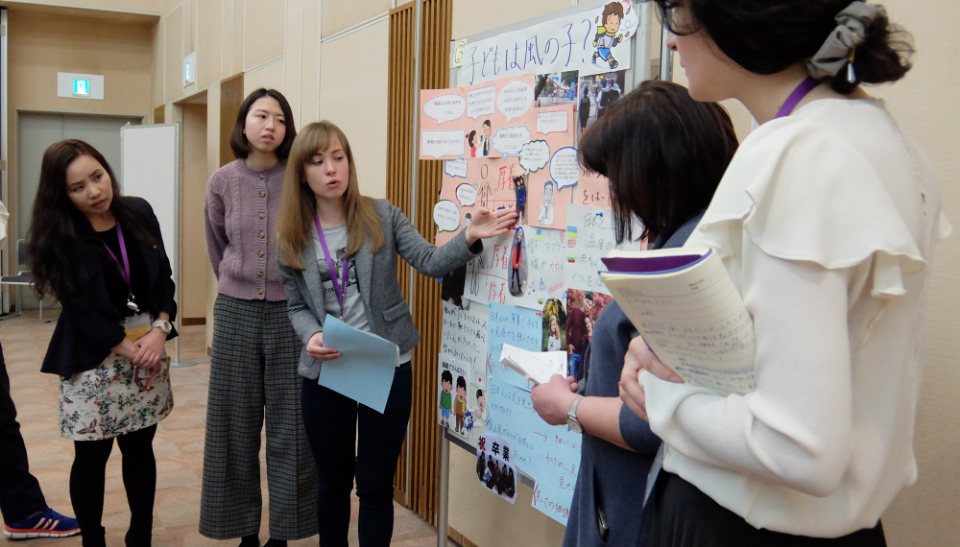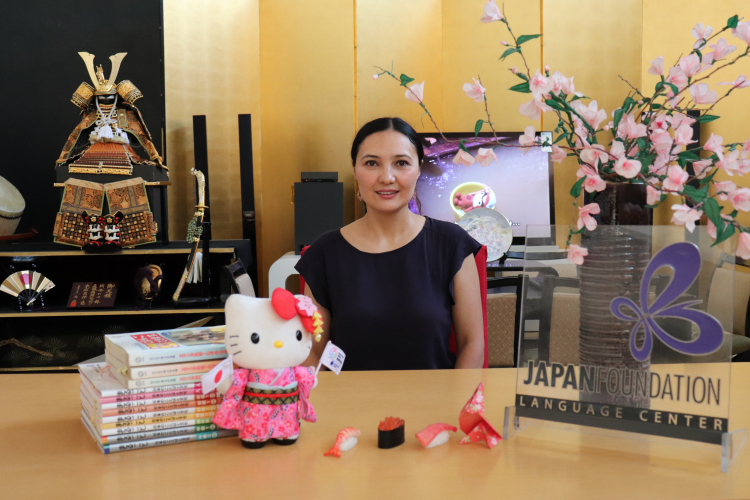2022.10.12
LANGUAGEA Second Home for Overseas Japanese Language Teachers, Training Programs Offered by the Japanese-Language Institute, Urawa

Japanese language teachers who are working overseas play an important role in the promotion of Japanese language education. At the Japan Foundation’s Japanese-Language Institute, Urawa, our training programs support teachers who want to continue to advance their careers.
Skillful Japanese language teachers are essential in order to increase opportunities for people to learn Japanese around the world. According to a 2018 survey conducted by the Japan Foundation (JF), there are approximately 77,000 Japanese language teachers worldwide. This is 18.9 times the number that existed in 1979, according to the survey. However, there is a constant need to improve teaching ability, and JF offers a variety of training and support for overseas Japanese language teachers at the Japanese-Language Institute, Urawa (the Institute) in Saitama City, and at JF’s overseas offices.
Since the Institute opened in 1989, more than 10,000 teachers have gone through the training program, taking advantage of its exclusive facilities and experts in Japanese language education who work there. Program graduates are now working around the globe. In addition to long-term and short-term on-site training programs, the Institute also offers country-specific training programs in cooperation with partner governments and ministries of education, programs co-sponsored by other organizations and online training programs.

The Japanese-Language Institute, Urawa also has a library specialized in Japanese language education with a comprehensive collection of Japanese language education materials and related resources from around the world.
Our training programs currently include the “Basic Training Program” for teachers who are at an early stage in their careers in order to comprehensively improve their Japanese language skills, acquire the basic teaching methodology and deepen their knowledge of Japan. Additionally, the “Japanese-Language Program” to further improve teachers’ Japanese language skills as well as the “Comprehensive Japanese Teaching Methods Program” for those with more than two years of teaching experience to improve their teaching methodology and to cultivate their ability to understand other cultures are also available. Participants in our on-site training programs stay at the Institute for intensive training. During this training, not only are there exciting classroom lessons with Japanese language teachers from around the world, there are also field trips, school visits and Japanese cultural activities such as “ikebana” (Japanese flower arrangement), Japanese calligraphy and Japanese tea ceremony. In response to COVID-19, from fiscal 2020 we have been offering online programs as well.
What I Learnt from the Institute Is a Learner’s Perspective
Let’s hear from some of the teachers who went through our training programs. First, we have Ms. Cholpon Kanbalayeva, working at the Kazakhstan-Japan Center for Human Development (KJC) which was established in 2002 to support human resource development in Kazakhstan and to promote mutual understanding between the two nations. At KJC, she is the manager of the JF Japanese language course which was launched in the spring of 2012.

Ms. Cholpon Kanbalayeva. Having graduated from Al-Farabi Kazakh National University, she now works at KJC where she is in charge of administration and teaching. She previously participated in JF’s on-site training programs. As the manager of the JF’s Japanese language course, she is also involved in course management.
After beginning her Japanese language studies at Al-Farabi Kazakh National University, Ms. Cholpon started working at the KJC, initially on a part-time basis. While assisting in the making of teaching materials, she began studying to become a Japanese language teacher and joined the Institute in May 2011 to participate in our Comprehensive Japanese Teaching Methods Program. This was just two months after the Great East Japan Earthquake. “Of course, I hesitated,” says Ms. Cholpon. “My family was also against it, but I decided to take the opportunity and when I arrived, I was very moved by the news that those who were affected by the earthquake were prioritizing saving other people’s lives over worrying about their own families. In order to understand how they could act in such a way I watched a lot of news on TV. Looking back now, I know that I went to Japan at the right time.”
During this time, JF formed the “JF Standard for Japanese-Language Education” based on the “Common European Framework of Reference for Languages,” which is being widely introduced as a set of guidelines for foreign language education around the world. As a framework to think about the methods of teaching and learning Japanese and evaluating student learning achievement, it is used for designing courses, creating lessons and making evaluations. According to Ms. Cholpon, “The training at the Institute also followed this standard, and every day we were instructed to evaluate our own mock classes out of three grades and write comments. Back then, because I was on the learning side, I always wondered why I had to do this process every day, but after returning to my country and now a teacher myself, I have finally come to understand its significance. Thanks to my experience as a learner, I can now put the tools learned through the training into use.”

Ms. Cholpon’s training session at the 2016 conference for graduates of the JF Course Instructor program. A shot of her giving a group presentation on designing a support course for specific purposes.
Since then, Ms. Cholpon has taken part in a number of our on-site programs. Participants share their experiences and after returning to their home countries, they put what they have learned into practice as teachers. “I learned a lot about making curriculums and designing courses and this became useful for my position as a manager of the Japanese language course,” says Ms. Cholpon. “Eventually, I would like to create a network of participants who have completed the program so we can share our experiences with students who have just joined.”
.png)
Ms. Cholpon giving a hiragana revision class as part of KJC’s summer Japanese course in 2022.
Opening Up a Career Path and Taking the On-Site Program While Gaining Experience
Next, we spoke with Ms. Katharina Dudzus, a full-time teacher at the Japan Cultural Institute in Cologne. She took the “Graduate Program in Japanese Language and Culture (Master’s Course)” at the Institute in 2007. This program started in 2001 as a collaboration between the Institute, the National Graduate Institute for Policy Studies, and the National Institute for Japanese Language and Linguistics, with the aim of developing educators who can take on the role of a leader in the field of Japanese language education in their home countries. During her long career, Ms. Dudzus has participated in many training programs.

Ms. Katharina Dudzus, a full-time teacher at the Japan Cultural Institute in Cologne (JF). After receiving her master’s degree in East Asian Studies at the University of Duisburg, Ms. Dudzus worked as a Coordinator for International Relations (CIR) under the JET Programme for three years before becoming a Japanese language teacher. She has taken many JF’s training programs including the Graduate Program in Japanese Language and Culture (Master’s Course).
However, there were twists and turns before Ms. Dudzus became a full-time Japanese teacher. As a child, Ms. Dudzus developed an interest in Japan through a close Japanese friend. Majoring in Japanese at university, she began studying the language in earnest and went to study in Japan for a year after entering graduate school. After graduation, she worked as a CIR for three years at a town hall in Ishikawa Prefecture. There she had the opportunity to teach German to local students, which sparked her interest in teaching languages, and she began considering a career as a teacher. “I found Japanese to be interesting as a language. However, in Germany, there were already many native Japanese teachers at the time, so I was worried about whether I would be able to find a job as a Japanese teacher in the future,” says Ms. Dudzus. “After returning to Germany, I began studying to become a Japanese language teacher at Landesspracheninstitut Nordrhein-Westfalen while also teaching Japanese privately. Luckily, in 2005, I managed to become a part-time teacher at the Japan Cultural Institute in Cologne, where I had been working part-time in the library.”
It was during this time that Ms. Dudzus learned of the Graduate Program in Japanese Language and Culture, and she joined in 2007. “I had the luxury of learning in an intensive class of a small size. I was envious when I heard from the Asian teachers who took the program with me that in their home countries there was a high demand for Japanese language study for the purpose of job seeking, and that there were many opportunities for employment as a Japanese language teacher.”

In 2017, Ms. Dudzus was in charge of the Japanese language trial course at the Japan Cultural Institute in Cologne during an evening event called, “Lange Nacht der Museen” (Long Night of the Museums).
Upon her return to Germany, Ms. Dudzus worked a total of four part-time jobs while improving her career. Finally, in 2011, she became a full-time teacher at the institute. She talked about her ambitions, saying, “I want to focus on training Japanese language teachers in Cologne from now on. I would also like to resume teaching Japanese cultural experience courses and visit schools to teach Japanese after the COVID-19 pandemic settles down.”
The tireless passion every Japanese language teacher has towards learning is the driving force behind the dissemination of the Japanese language throughout the world. Many of the Japanese language teachers who participate in the training at the Institute, who come from all over the world, already possess a wealth of knowledge. For this reason, we provide a place where participants can learn not only from the Institute’s experts, but also from each other. As a second home for Japanese language teachers working abroad, we at the Institute warmly welcome educators visiting Japan.

Ms. Dudzus teaching a Japanese language trial lesson at “Japan Day” in Düsseldorf in 2018. Japan Day is one of the largest Japanese cultural festivals in Europe, attracting around 600,000 people every year.
【Related pages】
A Second Home for Overseas Japanese Language Teachers, Training Programs Offered by the Japanese-Language Institute, Urawa
Japanese Language Education Blossoming in the Middle East from Cairo University; A 50-Year Journey Alongside the Japan Foundation
What is Needed to Communicate Effectively? The Path to Mutual Understanding as Shown by Japanese Language Learning Video Materials
